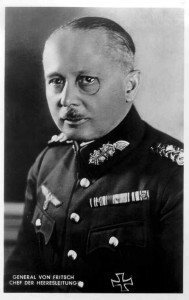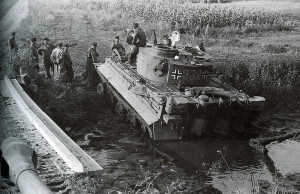by Wesley Adams
What a privilege to have had the chance to acquire and edit the new Farrar Straus Giroux edition of Unlikely Warrior: A Jewish Soldier in Hitler’s Army, Georg Rauch’s memoir of his harrowing experience as a part-Jewish soldier from Austria sent to the Russian front in 1943.
In 1984, Georg Rauch began writing his memoir in German, quoting liberally from the cache of eighty sketch-filled letters he’d sent home from the front, which his mother returned to him after the war. His wife, Phyllis—a former librarian from Ohio—worked at his side, translating his story into English. Once it was complete, the Rauches shared the manuscript privately with friends and visitors to the bed and breakfast they operated in Guadalajara, Mexico. Many readers encouraged them to try to find the memoir a wider audience.
This first edition sold several hundred copies and the book received many warm reviews from readers who found their way to it. Seven years later, Phyllis decided it was time to try to bring the book to a wider audience, sending it to several literary agents in New York, including Emmanuelle Morgen at Stonesong, who took on the project.
When Emmanuelle submitted it to me, I immediately felt this amazing story of a teenager forced to go to war needed to be published for both YAs and adults. I was fascinated in exactly the same way Emmanuelle was on first reading it. As she remembers: “My curiosity was at once piqued by the idea of a young boy with Jewish ancestry forced to fight for the wrong side in WWII. It was just such an odd, counter-intuitive concept that I wondered if it was real. Then in the first chapter there is an image of Georg presenting his birth certificate to his superior officer, and from that point I was captivated by the combination of danger, intrigue and—strange in a book about war—humor. It was as though Georg relied on his sense of humor to survive—like in the film Life Is Beautiful.”
Wesley Adams is an Executive Editor at Farrar Straus Giroux Books for Young Readers, an imprint of the Macmillan Children’s Publishing Group.
Read on for an excerpt from Unlikely Warrior: A Jewish Soldier in Hitler’s Army by Georg Rauch, translated by Phyllis Rauch
Introduction to the Trenches
The train jolted over an endless net of switches, then stopped. Amid shouted orders of “Faster! Faster!” everyone gathered up his belongings and jumped down onto the dark ground. A cloud-covered sky, faintly illuminated by the distant moon, shed the only light.
A command rang out. “Cars 18, 19, and 20, follow me!” and then, “Hurry up, don’t lose contact, and don’t leave anything behind!”
I stumbled through the night toward the silhouettes of numerous multistoried buildings. These had formerly housed railroad workers but were now evacuated. We scrambled up the stairs to take any room that was empty and installed ourselves on the bare floors for the night. That distant hum and rumbling never ceased, and I was afraid.
Shortly after dawn the next morning, we all assembled in an area between the house where we had slept and the narrow trenches that served as bomb shelters. An officer arrived, accompanied by a few sergeants. One of them shouted us to attention, and we clicked our heels together wherever we were standing. “At ease,” barked the officer. He passed a piece of paper to one sergeant, and the latter began reading off our names in alphabetical order. It was a list of about 120.
When the sergeant had finished reading, the officer addressed us. “You all belong to Division Number 282, Regiment 158, Second Battalion, First Company. I am your company commander, Oberleutnant von Fritsch.”
 General von Fritsch was a prominent Nazi officer, member of the German High Command, and the second German general to be killed during World War II. This image is in the public domain via LEMO Museum Online.
General von Fritsch was a prominent Nazi officer, member of the German High Command, and the second German general to be killed during World War II. This image is in the public domain via LEMO Museum Online.
After also being told the names of the battalion commander and the accompanying noncommissioned officers, we were permitted to fall out.
At the noon hour we lined up to draw our rations. At first, my mouth dropped open in disappointed surprise when I received a chunk of raw horsemeat, three large potatoes, and half an onion. I could tell my companions were obviously as surprised as I was . . . Remembering one of my mother’s favorite sayings, “Hunger is the best cook,” I began to take stock. Hmmm, wasn’t that an old, blackened frying pan that I had seen hanging on the wall of the otherwise empty kitchen in the apartment where I had spent the night? . . .
While the rest were still standing around looking perplexed, I was already on my way to find that frying pan. The rest of the undertaking was child’s play. Not more than ten minutes had elapsed until I was standing in front of the stove, skillet in hand, while the luscious aroma of frying meat, onions, and potatoes filled the room.
From my third-floor kitchen I had a perfect view of the train station where we had arrived and the town of Znamenka, which lay a little further off. These were surrounded by flat, untilled fields and then by the black earth of a plain that stretched away into the distance.
 A Nazi tank captured by the Soviet Union during the 1943 offensive. This image is in the public domain via World War II Pictures In Details.
A Nazi tank captured by the Soviet Union during the 1943 offensive. This image is in the public domain via World War II Pictures In Details.
I kept turning the meat and potatoes with the tip of my bayonet, and the smell became more and more tantalizing. Just about five minutes more, and it will be ready, I was thinking, when suddenly the air-raid siren on the roof of the adjoining building began to howl. Soon other sirens joined it, and I could hear shouted commands down on the ground below.
Little clouds of smoke from antiaircraft guns began appearing above the town, looking as though a painter’s brush had swiftly stippled them there, one after the other. Then I heard the droning of airplanes, increasing steadily in volume, accompanied by the explosions from antiaircraft guns and four-gun turrets.
What to do? If I run down to the shelter now, I’ll have to eat my food half-raw, because the coal will be all burned out by the time this is over. What a shame for this lovely food! I decided to wait a little longer. Just a few more minutes.
Now I saw the airplanes, at first just specks on the horizon but rapidly turning into streaks that seemed to be heading right in my direction. Then it dawned on me. The train station. An important target. Of course, that was why there were so many bomb craters all around. These planes weren’t coming for the first time.
One of the planes dived, trailing smoke as it crashed, and was followed by a second. Now I discovered smaller fighter planes carrying on dogfights in the midst of the larger bombers, all of them approaching rapidly.
“Just one minute more,” I pleaded silently. I leaned out the window for a second and saw that there wasn’t a soul in front of the house, but the trenches were full of helmeted heads, little steel spheres pressed tightly together.
It finally sank in that I was acting like a total idiot. At that same moment the droning noise became terribly loud and the floor under my feet began to shake. All at once, in the wall in front of me, a crack opened up from ceiling to floor, and a spray of mortar sailed through the air. I crammed my helmet onto my head and took off down the stairs, holding the frying pan with both hands.
I heard an enormous crash, and either from air pressure or movement of the house, I was thrown against the stair railing and showered with mortar and cement. I could see daylight through the cracks that were appearing everywhere in the walls.
Staggering drunkenly down the remaining stairs and out to the trenches, I managed to jump in just as the last of the planes roared over us and disappeared.
When I arrived the other soldiers, still holding their mess kits with the raw meat and potatoes, were just beginning to stretch their heads up out of the ground with relief. They laughed at me, pointing and saying what a hilarious sight I had made as I appeared out of a cloud of dust and powder, covered with mortar and wielding my steaming skillet.
I was their comic relief, but I also had the last laugh. Crawling back out of the trench, I sat down on a pile of artillery ammunition, where I scraped my pan clean—not at all bothered by the pieces of mortar.
After surviving the war, Georg Rauch (1924-2006) spent several years at an alpine TB clinic in Austria. His lifelong love of painting and drawing eventually led him to a successful career in fine art. In 1965, he met his future wife, Phyllis, in Vienna, and in the spring of 1966 they married, eventually settling in Guadalajara, Mexico. In 1984, he began writing his wartime memoir in German and worked with his wife on translating it simultaneously into English. He self-published it in 2006, four months before his death.
